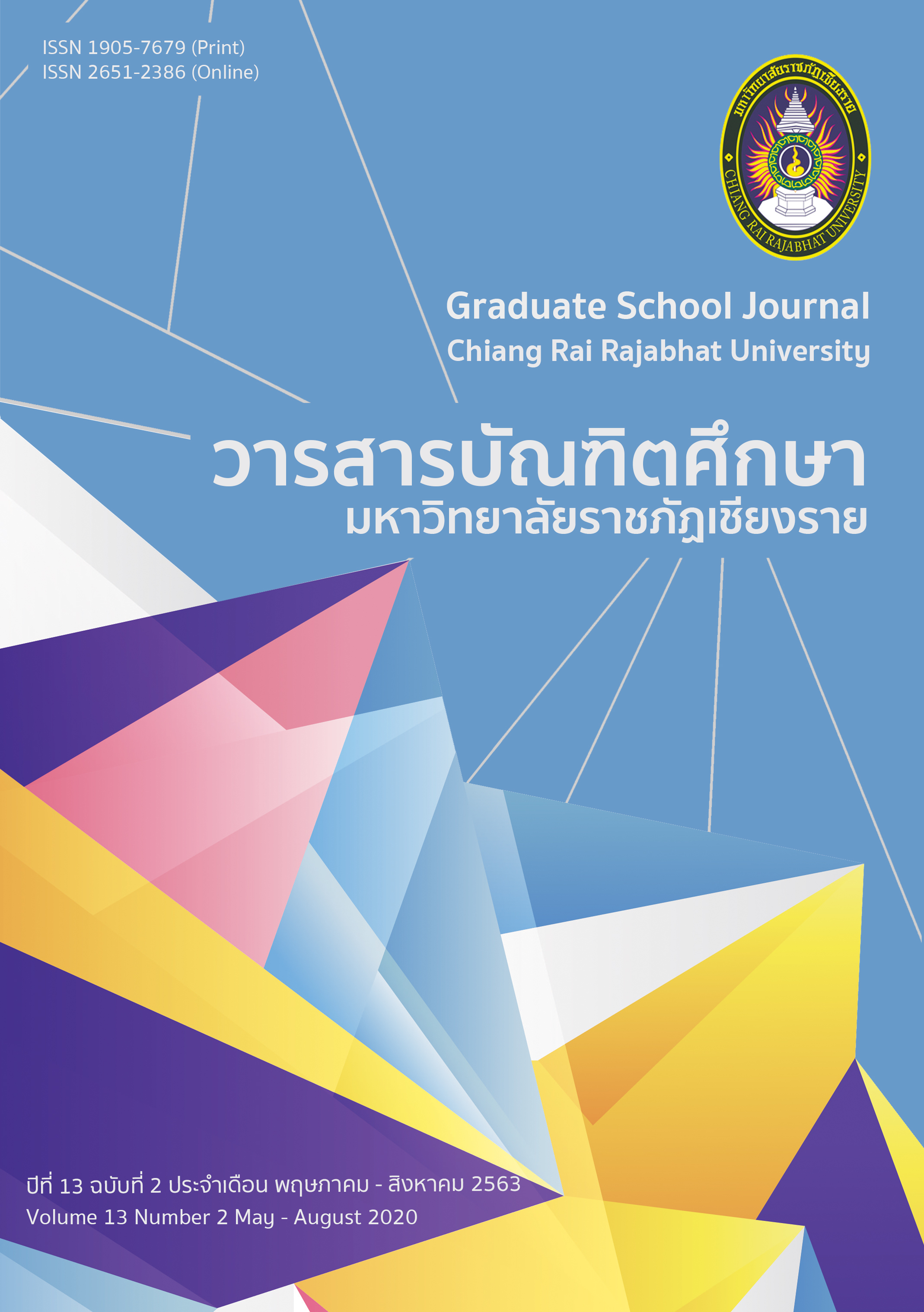การจัดการความรู้ภายในตัวบุคคลที่มีผลต่อประสิทธิภาพในการปฏิบัติงาน ของพนักงานสายสนับสนุน มหาวิทยาลัยราชภัฏแห่งหนึ่ง
Main Article Content
บทคัดย่อ
การวิจัยครั้งนี้เป็นงานวิจัยเชิงปริมาณ มีวัตถุประสงค์เพื่อศึกษาการจัดการความรู้ภายในตัวบุคคล ที่มีผลต่อประสิทธิภาพในการปฏิบัติงานของพนักงานสายสนับสนุน มหาวิทยาลัยราชภัฏแห่งหนึ่ง กลุ่มตัวอย่างที่ใช้ในการวิจัย คือ พนักงานสายสนับสนุน มหาวิทยาลัยราชภัฏแห่งหนึ่ง จำนวน 83 คน โดยใช้แบบสอบถามเป็นเครื่องมือในการเก็บรวบรวมข้อมูล วิเคราะห์ข้อมูลด้วยสถิติเชิงพรรณนา ประกอบด้วยสถิติค่าความถี่ จำนวนร้อยละ ค่าเฉลี่ย และส่วนเบี่ยงเบนมาตรฐาน วิเคราะห์ความสัมพันธ์ระหว่างตัวแปรอิสระโดยใช้สถิติสัมประสิทธิ์สหสัมพันธ์ของเพียร์สัน และวิเคราะห์อิทธิพลของตัวแปรด้วยการวิเคราะห์การถดถอยเชิงพหุ โดยใช้เทคนิควิธี Stepwise
ผลการวิจัยพบว่า ในภาพรวมการจัดการความรู้ภายในตัวบุคคลโดยใช้กระบวนการการจัดการความรู้ SECI Model มีผลต่อประสิทธิภาพในการปฏิบัติงาน หากพิจารณาตัวแปรอิสระรายด้าน พบว่า ตัวแปรที่ส่งผลต่อประสิทธิภาพในการปฏิบัติงาน คือ ด้านการแลกเปลี่ยนเรียนรู้ ด้านการควบรวมความรู้ และด้านการผนึกฝังความรู้ มีนัยสำคัญทางสถิติที่ระดับ 0.05 ส่วนด้านการสกัดความรู้ ไม่มีนัยสำคัญทางสถิติ และในภาพรวมการจัดการความรู้ภายในตัวบุคคลโดยการชี้นำตนเองในการเรียนรู้ของผู้ใหญ่มีผลต่อประสิทธิภาพในการปฏิบัติงาน หากพิจารณาตัวแปรอิสระรายด้าน พบว่า ตัวแปรที่ส่งผลต่อประสิทธิภาพในการปฏิบัติงาน คือ ด้านความรับผิดชอบในตัวบุคคล ด้านการเรียนรู้โดยการชี้นำตนเอง ด้านการชี้นำตนเองในการเรียนรู้ และด้านปัจจัยแวดล้อมทางสังคม มีนัยสำคัญทางสถิติที่ระดับ 0.05 ส่วนด้านผู้เรียนที่มีลักษณะชี้นำตนเอง ไม่มีนัยสำคัญทางสถิติ ทั้งนี้สามารถนำประโยชน์จากงานวิจัย รวมทั้งข้อเสนอแนะการวิจัยในอนาคต ไปเป็นแนวทางในจัดการพัฒนาทรัพยากรมนุษย์ในองค์กร และปรับปรุงพัฒนาองค์กรในด้านอื่น ๆ ต่อไป
Article Details
บทความที่ได้รับการตีพิมพ์เป็นลิขสิทธิ์ของวารสารมหาวิทยาลัยราชภัฎเชียงราย
ข้อความที่ปรากฏในบทความแต่ละเรื่องในวารสารวิชาการเล่มนี้เป็นความคิดเห็นส่วนตัวของผู้เขียนแต่ละท่านไม่เกี่ยวข้องกับมหาวิทยาลัยราชภัฎเชียงราย และคณาจารย์ท่านอื่นๆในมหาวิทยาลัยฯ แต่อย่างใด ความรับผิดชอบองค์ประกอบทั้งหมดของบทความแต่ละเรื่องเป็นของผู้เขียนแต่ละท่าน หากมีความผิดพลาดใดๆ ผู้เขียนแต่ละท่านจะรับผิดชอบบทความของตนเองแต่ผู้เดียว
เอกสารอ้างอิง
กรมควบคุมโรค. คู่มือการจัดการความรู้ กรมควบคุมโรค. สืบค้นเมื่อ 15 มีนาคม 2562, จาก http://www.kmddc.go.th
ประสพชัย พสุนนท์. (2558). ความเที่ยงตรงของแบบสอบถามสำหรับงานวิจัยทางสังคมศาสตร์. วารสารสังคมศาสตร์ มหาวิทยาลัยศรีนครินทรวิโรฒ, 18, 375-396.
ปิยะ ศักดิ์เจริญ. (2558). ทฤษฎีการเรียนรู้ผู้ใหญ่และแนวคิดการเรียนรู้ด้วยการชี้นำตนเอง : กระบวนการเรียนรู้เพื่อการส่งเสริมการเรียนรู้ตลอดชีวิต. วารสารพยาบาลทหารบก, 16(1), 8-13.
ภัทรนันท์ ศิริไทย และ ชิตพล ชัยมะดัน. (2559). ความสัมพันธ์ระหว่างแรงจูงใจกับประสิทธิภาพในการปฏิบัติงานของบุคลากรวิทยาลัยชุมชนสระแก้ว. วารสารด้านการบริหารรัฐกิจและการเมือง, 5(1), 157-197.
มหาวิทยาลัยมหิดล. (2552). การจัดการความรู้ของหน่วยงานในมหาวิทยาลัยมหิดล. นครปฐม: กองพัฒนาคุณภาพ มหาวิทยาลัยมหิดล.
มหาวิทยาลัยศิลปากร. สำนักหอสมุดกลาง. (2562). การจัดการความรู้. สืบค้นเมื่อ 15 มีนาคม 2562, จาก http://www.resource.lib.su.ac.th
สำนักงานปลัดกระทรวงการอุดมศึกษา วิทยาศาสตร์ วิจัยและนวัตกรรม. (2562). การจัดการความรู้ในองค์กรของสำนักงานคณะกรรมการการอุดมศึกษา ประจำปีงบประมาณ พ.ศ. 2562. สืบค้นเมื่อ 30 มกราคม 2563, จาก http://www.mua.go.th
อธิปไตย โพแตง และ ชัยฤทธิ์ โพธิสุวรรณ. (2559). การสะสมความรู้ในตัวคนเพื่อพัฒนาความสามารถในการปฏิบัติงานของแรงงานในสถานประกอบการ. วารสารวิชาการพระจอมเกล้าพระนครเหนือ, 26(2), 299-307.
Brockett R. G. and Hiemstra, R. (1991). Self-direction in adult learning : Perspectives on theory, research, and practice. New York: Routledge, Chapman and Hall.
Garvin, D. A. (1993). Building a learning organization. Harvard Business Review, 71(4), 78–91.
Knowles, M. S. (1975). Self-directed learning : A guide for learners and teachers. New York: Association Press.
Kruger, C. J. (Neels) and Johnson, R. D. (2011). Is there a correlation between knowledge management maturity and organizational performance?, The Journal of Information and Knowledge Management Systems, 41(3), 265–295.
Muthuveloo, R., Shanmugam, N. and Teoh, A. P. (2017). The impact of tacit knowledge management on organizational performance : Evidence from Malaysia. Asia Pacific Management Review, 22, 192-201.
Nonaka, I. and Takeuchi, H. (1995). The knowledge creating company : How Japanese companies create the dynamics of innovation. New York: Oxford University Press.
Nunnally, J. C. (1978). Psychometric theory. New York: McGraw-Hill.
Yamane, T. (1976). Statistics : An introductory analysis. 2nd ed. New York: Harper and Row.


